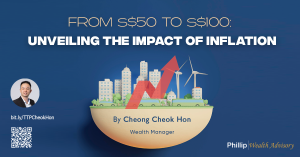Financial resolutions for 2022 January 6, 2022

The New Year is a perfect time to change old habits for the better. Eating healthier food, making more friends and getting fit are popular on the New Year resolutions’ list. Adopting some of these new resolutions will ensure that you are healthy in mind and body in 2022, but it is good to make some New Year financial resolutions too.
Here are five ideas for New Year resolutions that could help you meet your financial goals and some advice on how to achieve them.
1. Save more
Your top financial resolution should be to save more. In 2021, many people were forced to use up their savings to cover daily expenses or deal with income loss during the COVID-19 pandemic. So, more savings can help deal with future crises in a better way.
There are many ways to go about boosting your savings. For instance, you can look for a side income besides your main job, set up an automatic transfer to your savings account and cut back on the amount of money you spend on non-essentials.
According to the 50/30/20 general rule of thumb for savings by American politician Elizabeth Warren, the way to allocate your income is to split it into three categories: needs, wants, and financial goals1.
And she suggests that you save 20% of your monthly income for financial goals, which comprises all savings including retirement contributions, saving for a house, debt payments and investments.
Do remember, that if you delay starting saving, then the amount you may need to save later will go up as well.
2. Create a budget and stick to it
For some, a “budget” can feel complicated. However, tracking your spending is very useful to help you understand where your money goes every month. Thus, a clear budget provides direction on what you can afford to spend and what expenses you should cut back on.
According to a study from National University of Singapore Lee Kuan Yew School of Public Policy (LKYSPP) and Nanyang Technological University (NTU), a family of four needs at least S$6,426 a month to afford a basic standard of living2.
So, start by listing all your fixed expenses, such as housing, food, medical and savings. After deducting these expenses from your monthly income, you can see how much money you have left for discretionary expenses, such as eating out, clothing and entertainment. Then, rank them in order of importance, and cut the expenses that have the lowest importance until your income exceeds your expenditure.
Also, determine your financial priorities for 2022. For example, maybe you are looking forward to a vacation after the pandemic (but you should aim to spend no more than 4 percent of your after-tax income on vacations every year3), or refurbishing your house for a new look (total renovations should not exceed six times of your monthly household income4). You may put aside the money for these items, or increase your savings and treat the expenditure as money spent.
3. Start investing
Investing is a choice that you must make at the right time and the time is always right. It is definitely good to start investing at an early age, but it is equally important to sustain the investment for long-term wealth creation.
If you want to start investing, make sure you have a clear picture of your financial situation first, which includes spending, saving and taxes.
Once you know how much money you can invest, start researching.
As legendary investor Peter Lynch once said: “Know what you own and know why you own it.”
So, do your research for reading material online, read investment books, attend classes, or seek help from a financial advisor.
You can start with as little as S$100 in our Regular Savings Plan.
Related articles:
On Dollar Cost Averaging
On Personal Finance
4. Create an emergency fund
The pandemic has taught us that life can change in an instant, and that it is important to be prepared for the unexpected. If you have not created an emergency fund, now may be a good time to start.
Ideally, you should have three to six months’ worth of living expenses, with the money kept in a low-risk, high liquidity account5.
An emergency fund will not only help you cover unexpected but necessary expenses without having to sell volatile assets at depressed prices, but it can also keep you afloat if you lose your job.
Also, having an emergency fund can provide a comfortable cushion and allow you to have greater focus while you pursue new opportunities.
5. Look at your insurance coverage
Risk is a part of life, and your life can be upended by all kinds of surprises – an illness, job loss, disability, death or natural disasters.
If you do not have enough assets to insure against major risks, you should get insurance coverage to protect yourself against unexpected events.
If you have insurance coverage, make sure you find a licensed agent to review all your policies – life, disability, health or auto insurance. Check if the coverage is adequate, and also look around and see if there is a less expensive policy with similar coverage.
As a general rule of thumb, you are advised to spend 3% to 10% of your salary on protection-only insurance policies.
Related Video:
The Role of Insurance in Your Life Journey
In conclusion, 2021 was a tough year on many fronts, but with the New Year comes the chance to chart a path forward and get financially fit. The five financial resolutions we have offered you are just a start. The list is not exhaustive, but offers you a few ideas you could consider in 2022.
So, start saving, budgeting and investing and embark on a journey to a financially independent and secure future.
Reference:
- [1] https://www.thebalance.com/the-50-30-20-rule-of-thumb-453922
- [2] https://www.straitstimes.com/singapore/politics/family-of-four-needs-6426-a-month-for-basic-standard-of-living-in-spore-says
- [3] https://www.chatelaine.com/living/budgeting/how-much-do-you-spend-on-vacations/
- [4] https://www.dbs.com/livemore/home-tips/how-to-avoid-busting-your-renovation-budget.html
Disclaimer
These commentaries are intended for general circulation. It does not have regard to the specific investment objectives, financial situation and particular needs of any person who may receive this document. Accordingly, no warranty whatsoever is given and no liability whatsoever is accepted for any loss arising whether directly or indirectly as a result of any person acting based on this information. Opinions expressed in these commentaries are subject to change without notice. Investments are subject to investment risks including the possible loss of the principal amount invested. The value of the units and the income from them may fall as well as rise. Past performance figures as well as any projection or forecast used in these commentaries are not necessarily indicative of future or likely performance. Phillip Securities Pte Ltd (PSPL), its directors, connected persons or employees may from time to time have an interest in the financial instruments mentioned in these commentaries. Investors may wish to seek advice from a financial adviser before investing. In the event that investors choose not to seek advice from a financial adviser, they should consider whether the investment is suitable for them.
The information contained in these commentaries has been obtained from public sources which PSPL has no reason to believe are unreliable and any analysis, forecasts, projections, expectations and opinions (collectively the “Research”) contained in these commentaries are based on such information and are expressions of belief only. PSPL has not verified this information and no representation or warranty, express or implied, is made that such information or Research is accurate, complete or verified or should be relied upon as such. Any such information or Research contained in these commentaries are subject to change, and PSPL shall not have any responsibility to maintain the information or Research made available or to supply any corrections, updates or releases in connection therewith. In no event will PSPL be liable for any special, indirect, incidental or consequential damages which may be incurred from the use of the information or Research made available, even if it has been advised of the possibility of such damages. The companies and their employees mentioned in these commentaries cannot be held liable for any errors, inaccuracies and/or omissions howsoever caused. Any opinion or advice herein is made on a general basis and is subject to change without notice. The information provided in these commentaries may contain optimistic statements regarding future events or future financial performance of countries, markets or companies. You must make your own financial assessment of the relevance, accuracy and adequacy of the information provided in these commentaries.
Views and any strategies described in these commentaries may not be suitable for all investors. Opinions expressed herein may differ from the opinions expressed by other units of PSPL or its connected persons and associates. Any reference to or discussion of investment products or commodities in these commentaries is purely for illustrative purposes only and must not be construed as a recommendation, an offer or solicitation for the subscription, purchase or sale of the investment products or commodities mentioned.
About the author
Sunny Tan
Sunny Tan holds a degree in Actuarial Science from Universiti Tunku Abdul Rahman in Malaysia. He likes to share financial news and investment knowledge with the public.

 Back in Business: The Return of IPOs & Top Traded Counters in March 2024
Back in Business: The Return of IPOs & Top Traded Counters in March 2024  From $50 to $100: Unveiling the Impact of Inflation
From $50 to $100: Unveiling the Impact of Inflation  How to soar higher with Positive Carry!
How to soar higher with Positive Carry!  Why 2024 Offers A Small Window of Opportunity and How to Position Yourself to Capture It
Why 2024 Offers A Small Window of Opportunity and How to Position Yourself to Capture It 









